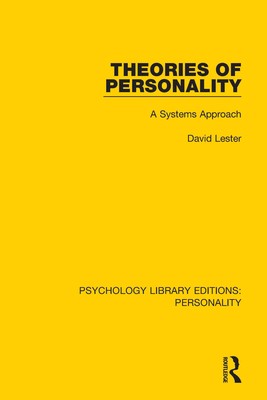
- We will send in 10–14 business days.
- Author: David Lester
- Publisher: Routledge
- ISBN-10: 0367133458
- ISBN-13: 9780367133450
- Format: 15.5 x 22.9 x 1.5 cm, minkšti viršeliai
- Language: English
- SAVE -10% with code: EXTRA
Reviews
Description
Designed as a text for both graduate and undergraduate students, this book, originally published in 1995, presents an intrapsychic explanation of human behaviour - concepts based on psychological processes and 'structures' within the mind. In this context, a unique treatment of personality theory is introduced. It focuses on Freud, Kelly and Angyal: Freud's psychoanalytic theory of personality based on desires, Kelly's personal construct theory for thinking, and Angyal's holistic concepts of personality.
Each theory is given a detailed analysis in separate chapters. Freud's psychoanalytic theory is cast as a theory of motivation, Kelly's personal construct theory as a theory of cognition, and then it is noted that there is no comprehensive theory of personality based on emotion. Although Angyal's holistic theory is rarely described in modern textbooks, Lester includes this because none of the other holistic theorists rival Angyal in their range of hypothetical constructs or descriptive terms. Then, in sections dealing with alternative viewpoints, the author shows how other personality theorists actually endorse and expand upon the ideas expressed by the aforementioned three, albeit with different terminology.
Recognizing the diversity of holistic views in theories of personality, several counterpoint chapters are devoted to the holistic ideas. Lester separates these into three major areas: theorists who have focused on the split in the mind between the real and ideal self; recent theorists who explore the possibility that the mind is a 'multiplicity of selves'; and theorists who, though not having their viewpoints sufficiently articulated in the literature, are still well established in the history of psychology. Other features include a presentation of the material in modern viewpoints, instead of the precise and perhaps outdated style as written by the individual theorists, and boxed highlights in each section, providing students with practical capsule information for easy reading.
EXTRA 10 % discount with code: EXTRA
The promotion ends in 23d.01:40:41
The discount code is valid when purchasing from 10 €. Discounts do not stack.
- Author: David Lester
- Publisher: Routledge
- ISBN-10: 0367133458
- ISBN-13: 9780367133450
- Format: 15.5 x 22.9 x 1.5 cm, minkšti viršeliai
- Language: English English
Designed as a text for both graduate and undergraduate students, this book, originally published in 1995, presents an intrapsychic explanation of human behaviour - concepts based on psychological processes and 'structures' within the mind. In this context, a unique treatment of personality theory is introduced. It focuses on Freud, Kelly and Angyal: Freud's psychoanalytic theory of personality based on desires, Kelly's personal construct theory for thinking, and Angyal's holistic concepts of personality.
Each theory is given a detailed analysis in separate chapters. Freud's psychoanalytic theory is cast as a theory of motivation, Kelly's personal construct theory as a theory of cognition, and then it is noted that there is no comprehensive theory of personality based on emotion. Although Angyal's holistic theory is rarely described in modern textbooks, Lester includes this because none of the other holistic theorists rival Angyal in their range of hypothetical constructs or descriptive terms. Then, in sections dealing with alternative viewpoints, the author shows how other personality theorists actually endorse and expand upon the ideas expressed by the aforementioned three, albeit with different terminology.
Recognizing the diversity of holistic views in theories of personality, several counterpoint chapters are devoted to the holistic ideas. Lester separates these into three major areas: theorists who have focused on the split in the mind between the real and ideal self; recent theorists who explore the possibility that the mind is a 'multiplicity of selves'; and theorists who, though not having their viewpoints sufficiently articulated in the literature, are still well established in the history of psychology. Other features include a presentation of the material in modern viewpoints, instead of the precise and perhaps outdated style as written by the individual theorists, and boxed highlights in each section, providing students with practical capsule information for easy reading.


Reviews